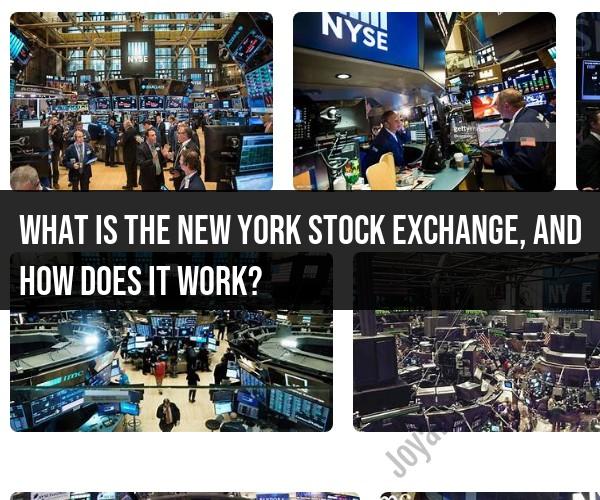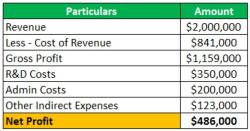What is the New York Stock Exchange, and how does it work?
The New York Stock Exchange (NYSE) is one of the largest and most well-known stock exchanges in the world. It plays a crucial role in the global financial markets by providing a platform for buying and selling shares of publicly-traded companies. Here's an overview of what the NYSE is and how it works:
What is the New York Stock Exchange (NYSE)?
The NYSE is a stock exchange located in New York City, and it's operated by Intercontinental Exchange (ICE). It was founded in 1792 and has a long history as one of the primary stock exchanges in the United States. The NYSE is known for its iconic trading floor, where traders, specialists, and brokers have historically conducted open outcry trading. However, in recent years, electronic trading has become the dominant method.
How Does the NYSE Work?
The NYSE facilitates the trading of stocks, which represent ownership in publicly-traded companies. Here's a simplified overview of how the NYSE works:
Listed Companies: Companies that want to have their shares traded on the NYSE must meet certain regulatory and financial requirements. Once approved, they become "listed" on the exchange.
Stock Ticker Symbols: Each listed company is assigned a unique stock ticker symbol, which is a short code used to identify the company's shares. For example, "AAPL" is the ticker symbol for Apple Inc.
Market Participants: Various market participants are involved in trading on the NYSE. These include:
- Brokers: Individuals or entities that buy and sell stocks on behalf of investors.
- Market Makers: These are firms that facilitate trading by buying and selling stocks in large volumes, helping to maintain liquidity.
- Specialists: Specialists are responsible for maintaining an orderly market for specific stocks. They manage the order book and execute trades.
Orders: Investors place orders to buy or sell shares of a particular stock. These orders can be market orders (executed at the current market price) or limit orders (executed at a specified price or better).
Trading Floor (Historical): In the past, traders would gather on the NYSE trading floor to execute orders in person. This open outcry system involved shouting and hand signals. However, electronic trading has largely replaced this method.
Electronic Trading (Current): Today, the majority of NYSE trading is conducted electronically. Orders are entered into a computerized trading system that matches buyers with sellers based on price and time priority.
Price Discovery: The NYSE provides a central marketplace where buyers and sellers can interact, and the prices at which trades occur help determine the stock's market price.
Regulation: The NYSE is subject to regulatory oversight by the U.S. Securities and Exchange Commission (SEC) and self-regulatory organizations like the Financial Industry Regulatory Authority (FINRA). These agencies ensure that the exchange operates fairly and transparently.
Market Hours: The NYSE has specific trading hours. It typically operates from 9:30 AM to 4:00 PM Eastern Time, Monday through Friday, with some exceptions for holidays.
Market Data: Real-time price and trading information for NYSE-listed stocks is widely available through financial news outlets, trading platforms, and stock market websites.
Investors and traders can participate in the NYSE by opening brokerage accounts with registered broker-dealers. They can then place orders to buy or sell stocks listed on the exchange through these brokerage accounts.
The NYSE plays a vital role in capital formation, as it provides companies with access to public capital by issuing shares to the investing public. It also serves as a barometer of market sentiment and economic health, as the movements of stock prices on the NYSE are closely watched by investors, analysts, and policymakers worldwide.
Demystifying the New York Stock Exchange: How It Operates
The New York Stock Exchange (NYSE) is the largest stock exchange in the world by market capitalization. It is a place where investors can buy and sell shares of publicly traded companies.
The NYSE uses an auction-based system to set prices. This means that buyers and sellers compete against each other to get the best price for their shares. The highest bidder and the lowest asking price are matched, and a trade is executed.
The NYSE is open for trading from 9:30 AM to 4:00 PM Eastern Time, Monday through Friday. However, there is also a pre-market trading session that begins at 4:00 AM Eastern Time, and a post-market trading session that ends at 8:00 PM Eastern Time.
The NYSE in Action: Understanding Its Inner Workings
The NYSE is a complex and dynamic place, but there are a few key things that investors should understand about how it works.
First, it is important to understand the different types of orders that investors can place. The most common types of orders are market orders, limit orders, and stop-loss orders.
- A market order is an order to buy or sell a stock at the best available price.
- A limit order is an order to buy or sell a stock at a specific price or better.
- A stop-loss order is an order to sell a stock at a specific price or worse.
Once an investor has placed an order, it is routed to a specialist, who is responsible for matching buyers and sellers. If the order cannot be matched immediately, it is placed in the order book, which is a list of all outstanding orders for a particular stock.
When a buyer's bid and a seller's ask match, a trade is executed. The trade is then reported to the Securities Information Processor (SIP), which is a central database that tracks all trades on U.S. stock exchanges.
Investing in the NYSE: A Closer Look at How It Functions
To invest in the NYSE, you need to open a brokerage account. A brokerage account is a type of account that allows you to buy and sell stocks and other securities.
Once you have opened a brokerage account, you can deposit money into it and start investing. To buy a stock, you need to place an order with your broker. Your broker will then execute the order on the NYSE.
When you buy a stock, you are buying a piece of ownership in a company. This means that you are entitled to a share of the company's profits, if it makes any. You are also entitled to vote on important corporate decisions.
If you decide to sell your stock, you can place an order with your broker. Your broker will then execute the order on the NYSE. When you sell a stock, you are giving up your ownership stake in the company.
Investing in the NYSE can be a complex and risky process, but it can also be a very rewarding one. If you are considering investing in the NYSE, it is important to do your research and understand the risks involved.













